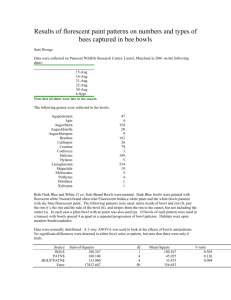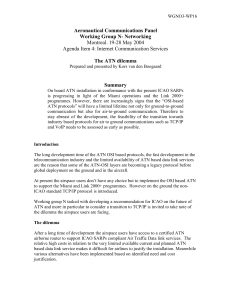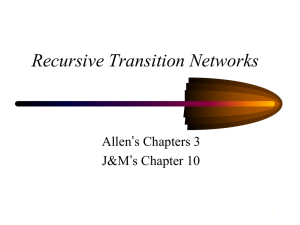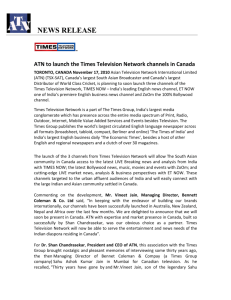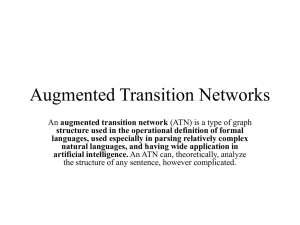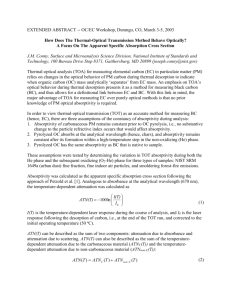PHARE Aeronautical Telecommunications Network
advertisement
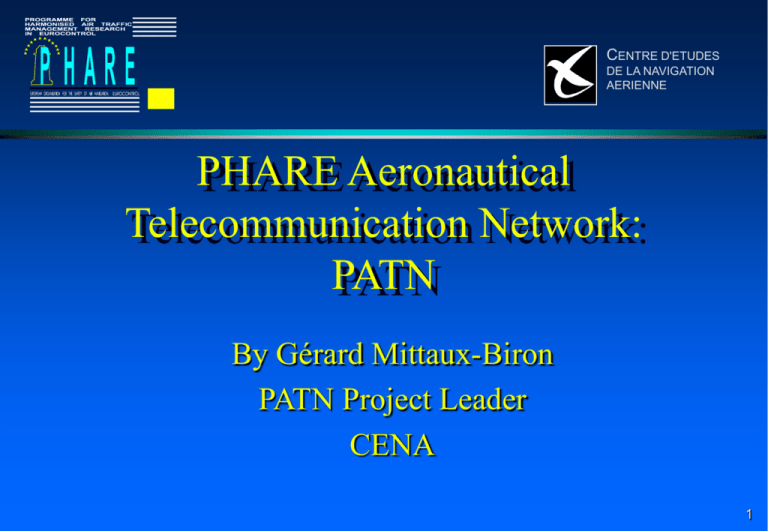
CENTRE D'ETUDES DE LA NAVIGATION AERIENNE PHARE Aeronautical Telecommunication Network: PATN By Gérard Mittaux-Biron PATN Project Leader CENA 1 What is PATN ? PATN is an implementation of the ATN that supported data-link communications for the 3rd PHARE Demonstration PATN is a collaborative work, carried out by: CENA in France, DERA/NATS in the United Kingdom, DLR in Germany, EEC for Eurocontrol, NLR in the Netherlands. 2 PATN Infrastructure: Interconnection of ATN routers SITA X.25 Network Transpac X.25 Network 3 PATN Infrastructure: Interconnection of ATN routers DERA/NATS NLR DERA/NATS NLR SITA X.25 Network EEC CENA ATH Transpac X.25 Network EEC CENA TLS 4 PATN Infrastructure: The end-systems DERA/NATS NLR DERA/NATS NLR SITA X.25 Network EEC CENA ATH Transpac X.25 Network EEC CENA TLS 5 Data-Link Services supported by PATN Downlinking of Aircraft Parameters (DAP) Frequency Change (FC) Position Reporting (PR) Trajectory Negotiation (TN) 6 Main Phases of the PATN Project PATN in stand-by during the external development of the ATN Router by the EURATN project Development of ATN Upper-Layers Development of PATN Application Service Elements Deployment of the PATN infrastructure: Routers PATN end systems Integration in the air and ground platforms of the partners 7 Technical Choices for PATN Compliance with International Civil Aviation Organisation (ICAO) standards for the Aeronautical Telecommunication Network whenever applicable Aeronautical Mobile Satellite Services (AMSS) retained as the mobile subnetwork for airground communications 8 PATN Approach to Developments Use of the EURATN router Use of commercial off-the-shelf industrial products ICAO Standard ATN application: Controller-Pilot Data-Link Communications PHARE-Specific applications: ATN Upper-Layers Downlinking of Aircraft Parameters ; Position Reporting ; Trajectory Negotiation Access to the mobile subnetwork: Interface between AMSS avionics and PATN workstations 9 PATN Spin-Offs ATN Validation AATMS project with the involvment of DERA and NLR CHARME project for CENA 10 ATN Validation First prototype implementation of ATN upper-layers communication services Agreement between PHARE and an industrial partner: The PATN upper-layers were re-engineered as an industrial product PATN partners are entitled free source and binary licences Free maintenance on the ATN upper-layers product First deployment of a full-stack ATN infrastructure with air and ground components Kernel of an ATN infrastructure for the PATN partners 11 AATMS Project Validation of advanced Flight Management Systems Implementation of a data-link infrastructure: Adapted ATN based on PATN Connection of: DERA BAC 1-11 experimental aircraft NLR Cessna Citation experimental aircraft AATMS ground infrastructure Transparently « switchable » access to: Aeronautical Mobile Satellite Services (AMSS) VHF Digital Link (VDL) mode 2 12 CHARME Project Experimental ATN platform of the French DGAC Support of data-link experimentations, such as: EOLIA (European pre-operational data-link application) COCLICO (internal CENA project on the co-operation of collaborative tools and data-link for the control) Contribution to the validation of the ICAO standards for the ATN: Future data-link applications ATN Security & System Management Connectionless ATN services 13 Existing PATN Enhancements For AATMS: access to VDL mode 2 Automatic Dependent Surveillance (ADS) application For CHARME: Automatic Dependent Surveillance (ADS) application and ADS Report Forwarding Flight Information Services (FIS) application Context Management application 14 Experimental Results Requirements per aircraft for the PD/3 scenario: 100 bytes every 10 seconds for Position Reporting up to 3000 bytes for a Trajectory Negotiation around 100 bytes per clearance Good behaviour of loopback configurations of upper-layers used for the simulated air-traffic Good behaviour of loopback configurations of ATN upperlayers used for the simulated air-traffic Problems with the reliability of the AMSS for data-link communications with the actual aircraft Better performances were stated by AATMS with VDL mode 2 15 Conclusion PATN provided the realistic data-link infrastructure required for PD/3 PATN contributed to the validation of the ATN protocol suite The quality of service provided by the mobile subnetwork is critical for the perceived quality of ATN services: AMSS did not perform as expected at the time of PD/3 The PATN components and infrastructure can be successfully built-upon by the partners 16 CENTRE D'ETUDES DE LA NAVIGATION AERIENNE PHARE Aeronautical Telecommunication Network: PATN By Gérard Mittaux-Biron PATN Project Leader CENA next 17
